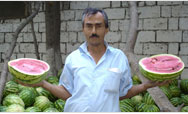Community-Based Services Strengthen Azerbaijan’s Vulnerable Families
Aygun and Tofig are the parents of two girls, Zarifa and Rugiya, and a son, Mahmud, who has cerebral palsy. Due to his condition, three-year-old Mahmud’s physical and speech development were equivalent to that of a one-year-old.
Strained relationships caused the family to move from the home that they had shared with Tofig’s parents. Lacking important registration papers, Tofig could qualify for a limited number of jobs and was unable to earn enough to pay rent. The family moved from house to house until finally returning to the unhealthy family environment they had left as a last resort. Tofig’s only work prospect was an offshore job that kept him away for weeks, while Aygun was treated like a servant by his family. She grew afraid to speak or ask questions for fear of jeopardizing her family’s safety.
Throughout this difficult time, the children were left without care. Mahmud suffered most, and was often left in a single room for days with only his basic needs met. Under intense stress, Aygun became increasingly irritable and irrational, snapping at her children and punishing them without cause. Vital duties, like taking an ill child to the doctor, were buried beneath an immense amount of housework.
 |
A group session at the Mingechevir Children and Family Support Center helps Mahmud, and other children with delays, develop motor skills.
Photo Credit: Save the Children |
This dire situation finally began to improve when a social worker from the Mingechevir Children and Family Support Center—which offers professional psychosocial assistance to address complex family relationships that trigger crisis situations for children—visited Aygun, based on a referral. It was a memorable day for Aygun. “It was November 22, 2007,” she recalls. “A ray of sunshine entered my life and I again started to believe in good people in the world.” Aygun and Mahmud were introduced to the Center’s services; their involvement rapidly improved Mahmud’s functioning and the entire family’s wellbeing.
Staff at the Children and Family Support Center, established under the USAID-funded Community-based Children’s Support Program, completed an individualized family assessment, and subsequently helped reconstruct good relationships between Aygun and her husband’s family through therapy sessions. The Center helped Tofig to obtain the documents he needed to qualify for more jobs, so that he is was able to find work locally. Since beginning twice-weekly rehabilitation classes, Mahmud has learned to sit, crawl, and choose objects—positive signs of active development. Through parent education sessions at the Center, Aygun learned to schedule time to play with her children each day, as well effective ways to reduce stress and parent more effectively.
Now an active participant of the Center’s Parent Group, Aygun encourages other struggling parents by her family’s example that that even the most challenging circumstances can improve with community support. Through Mingechevir’s Children and Family Support Center, Tofig and Aygun were able to overcome their family’s vulnerability truly caring for their children’s needs.
Back to Top ^ |


